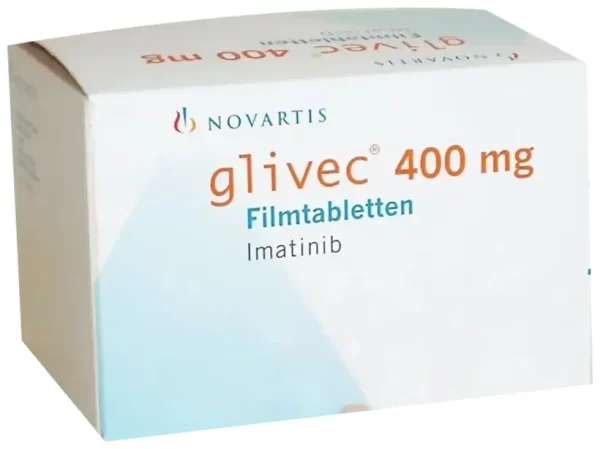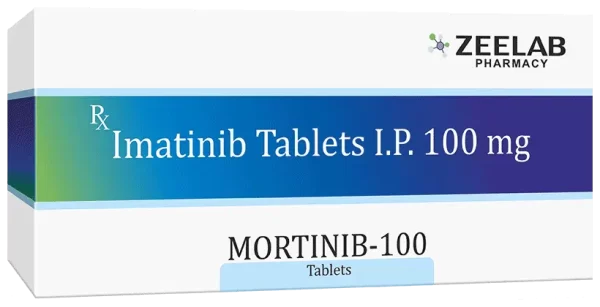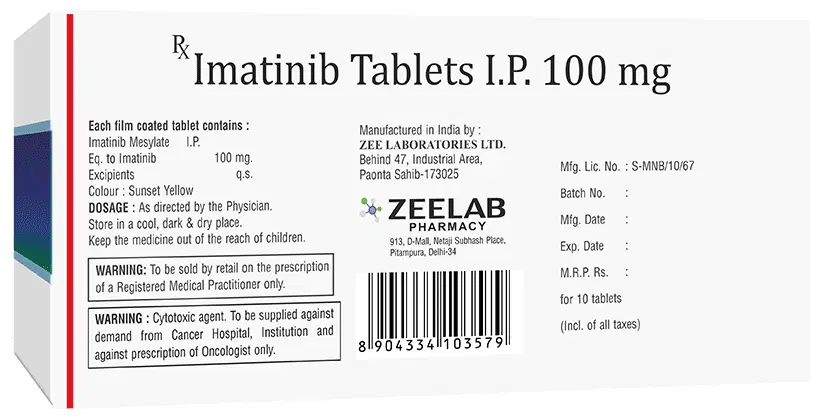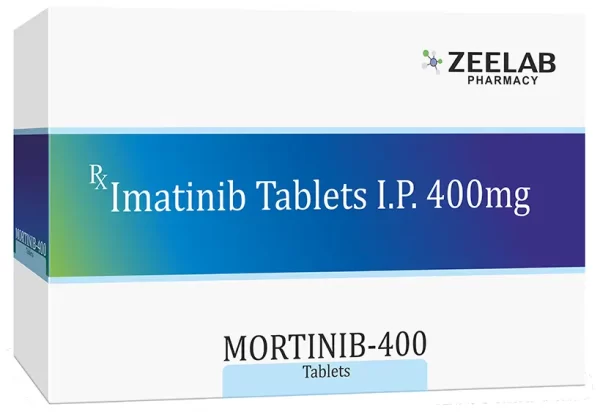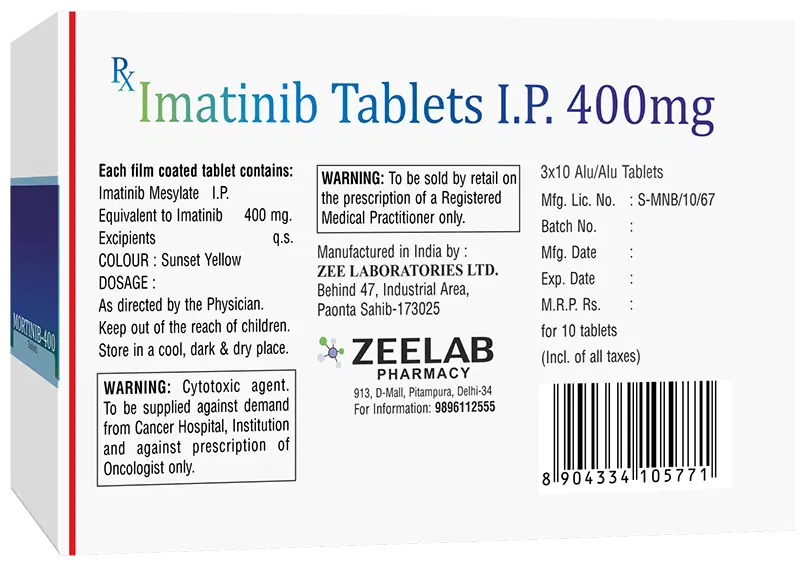Gleevec (Imatinib Mesylate) Tablet
Branded
Generic
Imatinib Mesylate (Generic Equivalent to Gleevec)
Imatinib Mesylate (Generic Equivalent to Gleevec)
Imatinib Mesylate (Generic Equivalent to Gleevec)
Imatinib Mesylate (Generic Equivalent to Gleevec)
Gleevec Tablet belongs to the class of medicines known as tyrosine kinase inhibitors. It is used in the treatment of blood cancer (chronic myeloid leukaemia and Acute lymphocytic leukemia) and gastrointestinal stromal tumor.
Gleevec Tablet should be taken with food, but better to have it same time every day to get the most benefit. You should continue to take it as long as your doctor advises for it. The duration of treatment varies according to your need and response to treatment. Taking it in the wrong way or taking too much can cause very serious side effects. It may take several weeks or months for you to see or feel the benefits but do not stop taking it unless your doctor tells you to.
The most common side effects of this medicine include edema, nausea, vomiting, muscle cramps, musculoskeletal pain, diarrhea, rash, fatigue, and abdominal pain. Let your doctor know if you experience unexpected rapid weight gain. Your doctor may advise for regular monitoring of blood cells and liver function while you are taking this medicine. Do not drive or do anything requiring mental focus if you experience dizziness and blurry vision.
Many other medicines can affect, or be affected by, this medicine so let your healthcare team know all medications you are using. This medicine is not recommended during pregnancy or while breastfeeding. The use of effective contraception by both males and females during treatment is important to avoid pregnancy.
Uses Of Gleevec Tablet
- Blood cancer (Chronic myeloid leukaemia)
- Blood cancer (Acute lymphocytic leukemia)
- Gastrointestinal stromal tumour
Benefits Of Gleevec Tablet
In Blood Cancer (Chronic Myeloid Leukaemia)
Blood cancer, also called leukemia, is a cancer of the blood-forming tissues,that decreases the body’s ability to fight infection. Gleevec Tablet kills or stops the growth of cancer cells and also prevents the multiplication of cancer cells. It is a potent and very toxic medicine and you should discuss the risks and benefits with your doctor. You should avoid drinking alcohol while having this treatment and drink plenty of water to stay hydrated.
In Blood Cancer (Acute Lymphocytic Leukemia)
Blood cancer, also called leukemia, is a cancer of the blood-forming tissues,that decreases the body’s ability to fight infection. Gleevec Tablet kills or stops the growth of cancer cells and also prevents the multiplication of cancer cells. It is a potent and very toxic medicine and you should discuss the risks and benefits with your doctor. You should avoid drinking alcohol while having this treatment and drink plenty of water to stay hydrated.
In Gastrointestinal Stromal Tumour
A gastrointestinal stromal tumor (GIST) is a type of tumor that occurs most commonly in the stomach or small intestine. The tumors develop into the specialized cells called interstitial cells of Cajal (ICCs). Gleevec Tablet helps to kill the cancer cells and also stops their further growth and spread. Follow your doctor’s instructions carefully to get the most benefit.
Side Effects Of Gleevec Tablet
Most side effects do not require any medical attention and disappear as your body adjusts to the medicine. Consult your doctor if they persist or if you’re worried about them.
Common Side Effects Of Gleevec
- Edema (swelling)
- Nausea
- Vomiting
- Muscle cramp
- Musculoskeletal (bone, muscle or joint) pain
- Diarrhea
- Rash
- Fatigue
- Abdominal pain
How To Use Gleevec Tablet
Take this medicine in the dose and duration as advised by your doctor. Swallow it as a whole. Do not chew, crush or break it. Gleevec Tablet is to be taken with food.
How Gleevec Tablet Works
Gleevec Tablet is an anti-cancer medication. A protein enzyme, bcr-abl tyrosine kinase, responsible for the growth of abnormal proliferation of cancer cells. This medicine inhibits the proliferation and induces apoptosis (planned cell death) in bcr-abl positive cells (cancer cells). This is how it works to stop or slow the spread of cancer.
Disclaimer :The information provided on the website is intended to facilitate awareness about healthcare products and medical conditions generally but it is not a substitute for professional medical attention or advice. You should always speak with a qualified healthcare practitioner before taking any prescription or non-prescription drug. |
| Product Type--Salt | Generic–Imatinib Mesylate (Generic Equivalent to Gleevec), Brands–Gleevec |
|---|---|
| tag--Manufacturer | Best Selling–Zeelab Pharmacy, Top Brand–Resonance Laboratories, Branded–Novartis, Best Selling–Zeelab Pharmacy, Top Brand–Resonance Laboratories, Branded–Novartis |
| Power--Pack Size | 100mg–30 Tablets, 100mg–60 Tablets, 100mg–90 Tablets, 100mg–180 Tablets, 100mg–30 Tablets, 100mg–60 Tablets, 100mg–90 Tablets, 100mg–180 Tablets, 100mg–30 Tablets, 100mg–60 Tablets, 100mg–90 Tablets, 100mg–180 Tablets, 400mg–30 Tablets, 400mg–60 Tablets, 400mg–90 Tablets, 400mg–180 Tablets, 400mg–30 Tablets, 400mg–60 Tablets, 400mg–90 Tablets, 400mg–180 Tablets, 400mg–30 Tablets, 400mg–60 Tablets, 400mg–90 Tablets, 400mg–180 Tablets |

